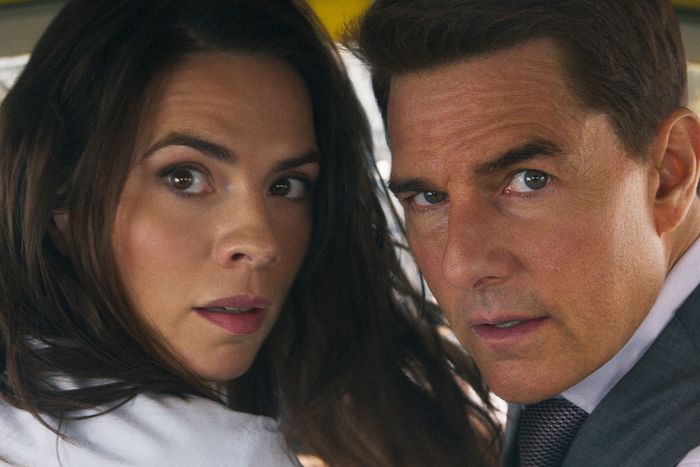
Warning: This post spoils many plot details of Mission: Impossible — Dead Reckoning Part One.
The Mission: Impossible franchise redefines its possibilities with each film. The stunts are more ludicrous, the villains more nefarious, the apocalypse more inevitable until the martyr Ethan Hunt sacrifices himself for us all. What has seemingly become impossible within this milieu, though, is room for more than one brunette woman sidekick at a time.
These films, including the most recent Dead Reckoning Part 1, have certain static components: IMF is always the outsider among the other American intelligence agencies. Ving Rhames has always been Ethan’s best friend, the trusted hacker Luther Stickell, who wears an impressive array of jaunty hats. Ethan is incapable of following orders, forever abandoning the missions he’s chosen to accept and going his own way to save as many people as he can. These have been constants since the first Mission: Impossible in 1996. Since then, we’ve seen Ethan free-solo skyscrapers, hang off and jump out of airplanes, drive off cliffs, outrun sandstorms, and swim underwater for several long minutes at a time. Hang out with the same dark-haired lady more than once, though? Unlikely. More than twice? Fine, but she’s gotta make a hard exit by her third appearance, preferably to make room for another brunette with quasi-romantic chemistry with Ethan. Case in point: Dead Reckoning, where one brunette woman gets killed off so another brunette woman can live.
This pattern goes back to the beginning of the franchise, with the women Ethan works with or loves either dying, being written out, or simply never mentioned again. Emmanuelle Béart’s Claire dies at the end of Mission: Impossible. Michelle Monaghan’s Julia, Ethan’s kidnapped fiancee in Mission: Impossible III, becomes his wife and hides from harm after a faked death in Ghost Protocol, then fully exits the franchise in Fallout, where she’s re-introduced with a new husband. Thandiwe Newton’s Nyah in Mission: Impossible 2, Maggie Q’s Zhen in Mission: Impossible III, and Paula Patton’s Jane in Ghost Protocol all survive their respective films but, unlike Rhames’s Luther or Simon Pegg’s Benji, they don’t become fixtures of Ethan’s team. It’s all very Highlander-esque for these women; there can be only one! And that extends to Rebecca Ferguson’s Ilsa, who after her introduction in Rogue Nation strikes up a deep, romantic-ish bond with Ethan that lasts through Fallout and part of Dead Reckoning — until she dies protecting Hayley Atwell’s Grace, a thief who is lightly positioned as a new love interest for Ethan. It’s not exactly a fridging for Ilsa, but it’s a pretty frosty exit for the most meaningful female character this franchise has had in years.
Dead Reckoning tries to be self-aware about this recurring tendency, priming us for Ilsa’s erasure by acknowledging how previous films have treated the brunettes in Ethan’s life; Esai Morales’s Gabriel says to Grace, “It’s important that you understand that you are not unique.” (Naturally, Gabriel and Ethan hate each other because the former killed another dark-haired beauty who was significant to the latter.) After Ilsa dies, the movie tries to honor the character by having Grace say to Luther, “I’m the reason she’s dead,” to which Luther responds, “She’s the reason you’re alive.” It was Ilsa’s choice to take on Gabriel and stop him from killing Grace, just like she chose to get back into the game after Ethan, like he did with Julia, faked her death to keep her safe. Someone somewhere will surely say this is all very feminist, actually! But those qualifications don’t quite change the assembly-line feeling of Ilsa leaving this franchise right when Grace enters it.
Maybe this frugality is meant to give Cruise different people to play against, and to keep the cast fresh. But these female characters are so often similarly sketched — self-sufficient but loyal, gorgeous but unpretentious, cheeky but not rude — that the result is a kind of disposability. These women can’t get too close to Ethan because his motives are always purer than sexual; when he kisses Jane in Ghost Protocol or lets himself get kissed by Vanessa Kirby’s White Widow in Fallout, those are both tactical moves, not emotional expressions. Ethan drives these movies forward, and his irreplaceability will always be at odds with the female cast members’ interchangeability. Killing Ilsa off veers Ethan briefly away from the romantic-hero track, and keeps him unattainable, primal, elemental — in the franchise’s own terms, a manifestation of destiny and a mind-reading, shape-shifting incarnation of chaos. The magic trick that the Mission: Impossible movies have pulled off is making Ethan seem increasingly immortal while making the women around him disappear.
More From This Series
- The Second Annual Stunt Awards Are Here
- Where to Watch Every Mission: Impossible Thing Right Now
- The Ending of Dead Reckoning Takes Mission: Impossible Back to the Start


